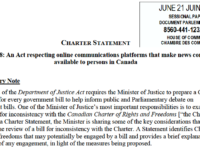Just one week after Canadian Heritage and CRTC officials provided assurances to a Senate committee that the Commission’s regulatory powers over freedom of expression were constrained by the Charter of Rights and Freedoms, the CRTC yesterday released a ruling in which the majority ignored the Charter altogether in regulating content on Radio-Canada. The decision signals how Bill C-11 could be used to regulate Internet content the CRTC deems contrary to Broadcasting Act policy objectives. It also continues a disturbing trend of revelations that have come in the aftermath of Canadian Heritage Minister Pablo Rodriguez cutting off debate to rush the bill through the House of Commons: officials later admitting that the $1B claim of benefits is merely an “illustrative” estimate, CRTC Chair Ian Scott opening the door to indirect algorithmic regulation, and now the release of a decision on content regulation that dates back to November 2020.
Post Tagged with: "charter of rights"
The Missing Bill C-18 Charter Statement: Why Did the Justice Department Remove the Document Confirming the Online News Act Includes Payments for Internet Linking?
Last Tuesday, Justice Minister David Lametti tabled his department’s Charter statement for Bill C-18, the Online News Act. A link to the statement appeared briefly on the department’s website, but by the end of the week reference to the Bill C-18 Charter statement was removed from the Justice site altogether. As of this morning, there is still no reference to the statement, even though it is a public document having been tabled in the House of Commons. In fact, I have now obtained a copy of the Charter statement and posted it publicly here with an embed below. The department will presumably re-post the statement at some point and it would be useful to confirm that it remains unchanged and provide an explanation for the online removal (I asked and did not get a response). [UPDATE: Hours after this blog post went live, the government posted the Charter statement.]
Picking Up Where Bill C-10 Left Off: The Canadian Government’s Non-Consultation on Online Harms Legislation
The Canadian government released its plans yesterday for online harms legislation with a process billed as a consultation, but which is better characterized as an advisory notice, since there are few questions, options or apparent interest in hearing what Canadians think of the plans. Instead, the plans led by Canadian […]
Failing Analysis: Why the Department of Justice “Updated” Charter Statement Doesn’t Address Bill C-10’s Free Speech Risks
The Department of Justice yesterday released its updated Charter statement on Bill C-10. To the surprise of absolutely no one, the department argued that the bill is Charter compliant. That conclusion was never in doubt as the statement is quite clearly more a political document than a legal analysis. The only real questions were whether the department would seriously grapple with the freedom of expression implications of treating all user generated content as a “program” subject to regulation by the CRTC and if Minister of Justice David Lametti would come to the Standing Committee on Canadian Heritage to answer questions on the statement. It turns out the answer is no to both questions: the statement glosses over the actual concerns with Bill C-10 and Lametti will be a no-show at the committee hearing.
Liberals and NDP Block Debate On Updated Charter of Rights and Freedoms Review of Bill C-10
The Standing Committee on Canadian Heritage continued its clause-by-clause review of Bill C-10 on Friday. As reported in the National Post and iPolitics, the meeting featured a motion brought by Conservative MP Rachael Harder calling on the committee to suspend review of the bill until an updated review of the Charter of Rights and Freedoms implications can be conducted by the Minister of Justice in light of the removal of Section 4.1, that provided safeguards against regulating user generated content under the Broadcasting Act. The motion also calls on the Ministers of Justice and Canadian Heritage to appear before committee to discuss the issue.











